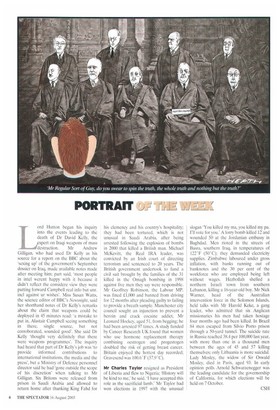PORTRAIT _r __J L e ord Hutton began his inquir into the events
leading to the death of Dr David Kelly, the xpert on Iraqi weapons of mass destruction. Mr Andrew Gilligan, who had used Dr Kelly as his source for a report on the BBC about the 'sexing up' of the government's September dossier on Iraq, made available notes made after meeting him; part said, 'most people in intel werent happy with it because it didn't reflect the considere view they were putting forward Campbell real info but unr. incl against ur wishes'. Miss Susan Watts, the science editor of BBC's Newsnight, said her shorthand notes of Dr Kelly's remarks about the claim that weapons could be deployed in 45 minutes read: 'a mistake to put in, Alastair Campbell seeing something in there, single source, but not corroborated, sounded good'. She said Dr Kelly 'thought very definitely that there were weapons programmes'. The inquiry had heard that part of Dr Kelly's job was 'to provide informed contributions to international institutions, the media and the press', but a Ministry of Defence personnel director said he had 'gone outside the scope of his discretion' when talking to Mr Gilligan. Six Britons were released from prison in Saudi Arabia and allowed to return home after thanking King Fahd for
his clemency and his country's hospitality; they had been tortured, which is not unusual in Saudi Arabia, after being arrested following the explosion of bombs in 2000 that killed a British man. Michael McKevitt, the Real IRA leader, was convicted by an Irish court of directing terrorism and sentenced to 20 years. The British government undertook to fund a civil suit brought by the families of the 31 killed in the Omagh bombing in 1998 against five men they say were responsible. Mr Geoffrey Robinson, the Labour MP, was fined £1,000 and banned from driving for 12 months after pleading guilty to failing to provide a breath sample. Manchester city council sought an injunction to prevent a heroin and crack cocaine addict, Mr Leonard Hockey, aged 51, from begging; he had been arrested 97 times. A study funded by Cancer Research UK found that women who use hormone replacement therapy combining ()estrogen and progestogen doubled the risk of getting breast cancer. Britain enjoyed the hottest day recorded; Gravesend was 100.6°F (37.9°C).
Mr Charles Taylor resigned as President of Liberia and flew to Nigeria; 'History will be kind to me,' he said. 'I have accepted this role as the sacrificial lamb.' Mr Taylor had won elections in 1997 with the unusual
slogan 'You killed my ma, you killed my pa. I'll vote for you.' A lorry bomb killed 12 and wounded 50 at the Jordanian embassy in Baghdad. Men rioted in the streets of Basra, southern Iraq, in temperatures of 122°F (50°C); they demanded electricity supplies. Zimbabwe laboured under gross inflation, with banks running out of banknotes and the 30 per cent of the workforce who are employed being left without wages. Hezbollah shelled a northern Israeli town from southern Lebanon, killing a 16-year-old boy. Mr Nick Warner, head of the Australian intervention force in the Solomon Islands, held talks with Mr Harold Keke, a gang leader, who admitted that six Anglican missionaries his men had taken hostage four months ago had been killed. In Brazil 84 men escaped from Silvio Porto prison through a 50-yard tunnel. The suicide rate in Russia reached 38.4 per 100,000 last year, with more than one in a thousand men between the ages of 45 and 57 killing themselves; only Lithuania is more suicidal. Lady Mosley, the widow of Sir Oswald Mosley, died in Paris, aged 93. In early opinion polls Arnold Schwarzenegger was the leading candidate for the governorship of California, for which elections will be held on 7 October.
CSH










































































 Previous page
Previous page